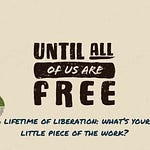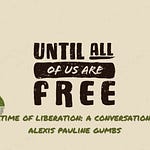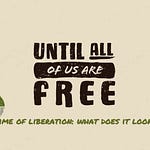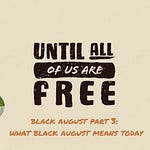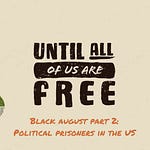We are now three months into our in-person Beloved Community gatherings and they have been so wonderful. We’ve been learning so much together, and the gatherings have given us a chance to connect and restore, so we feel more empowered to protect each other and take on these violent systems.
As word of these gatherings have spread, I’ve heard from quite a few online community members who are interested in starting gatherings like these where they live. So, never one to gatekeep, I put together this review of my experience stewarding gatherings in Seattle, in the hopes that it can help inspire people to create gatherings of their own.
I hope in this you’ll find ideas that you can apply to your own community, and tailor them to meet your community’s needs.
If you’re interested in starting your own abolitionist community gatherings, here are some things you might want to consider.
(ps: if you want to join our book club, be sure to read to the end for more info!)
What is your goal? Why do you want to create these gatherings and what would be a successful outcome of these gatherings? What do you want these gatherings to do for you, and what do you want them to do for others?
What is your skillset? What skillset do you bring to these gatherings that will aid you in organizing or facilitating them? Is it who you know in community? Is it your sense of humor? Is it your knowledge of abolition? Is it simply your willingness to make the calls to gather people? Is it your love of community? Knowing what you bring and knowing that you always have something of value to bring is important.
What are your limitations? Be honest about your limitations and ask people to take on work that might not be your areas of strength. Be honest and don’t try to be a hero. This is collective work and it is important to allow opportunities for everyone to find a place to put their skills to work in it.
What are your accessibility needs? How will people get to your gatherings? Do you need wheelchair access? Do you need a space without stairs? Do you need chairs that accommodate larger bodies? Do you need people to wear masks? Think about who you are hoping will join and try to make your gatherings as accessible as possible for those people to join. And if you find that you think you don’t need any of the above accommodations, you may want to ask yourself if your definition of community is broad or inclusive enough for liberation work.
How often will you meet? Think about, not only how often you’d like to meet up with people, but honestly about how often you could put these gatherings together without them becoming too draining. (I know that I personally can only host one gathering a month, because there is a lot of work involved and I want to be able to host my gatherings for the rest of the year without becoming burnt out.)
How will you handle conflict? Discussing how you might handle conflict before it starts and getting collective agreement to being willing to engage in a conflict resolution process is vital to the success of any community. Have these discussions as early as possible.
How will you get feedback? How will people be able to give suggestions or feedback on how the gatherings are going? Will they call or text you? Will they email a particular address? Will there be time at the gathering for suggestions?
How will you measure the impact of these gatherings? In times like this, we need to be regularly assessing the impact of these gatherings for effectiveness to make sure that they don’t become distractions from important work, instead of aids to that work. So how will you measure success? Is it in the the healing that people feel so that they can better do important work in their communities? Is it in the actionable knowledge that people gain? Is it in the regular updates of on-the-ground work that is happening in your community that members can support or join? Is it in the improved ability to connect and protect each other?
What is your budget? You don’t need a budget to gather community together. But if you’re going to be renting a space or providing food and beverage, you will need to consider how you are going to provide that and if it’s sustainable.
How will you keep safe? While safety cannot ever be guaranteed, we can make gatherings more safe by considering where we gather, who we gather with, what boundaries we will put in place to protect privacy and respect consent, and what we will do if any abuses occur.
Want to join our Beloved Community Book Club?
We’re starting a book club! I’ve wanted to start a book club for years and I’m so excited to finally be doing it. For our first selection for August, we’ll be reading Conflict Is Not Abuse by Sarah Schulman. This book club will meet virtually, so it is open to you no matter where you live.
If you want to join, fill out this little form to be added to our mailing list.
Where you can find more Until All Of Us Are Free
Ijeoma Oluo: website | Instagram | Behind the Book | Be A Revolution
This project is created and hosted by Ijeoma Oluo
Music produced by Gabriel Teodros: website | bandcamp | Instagram | substack





